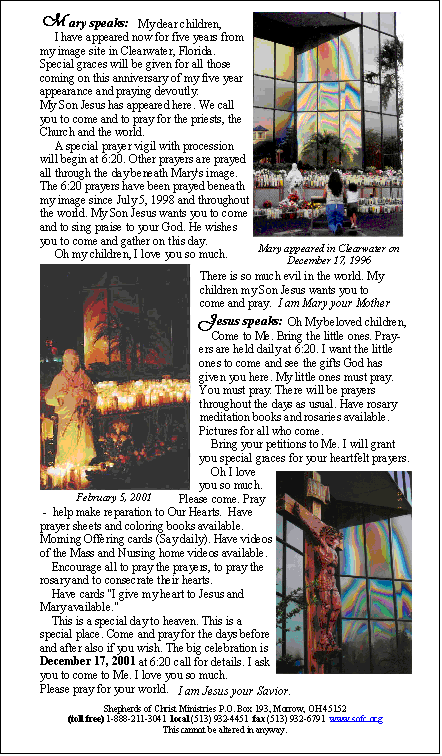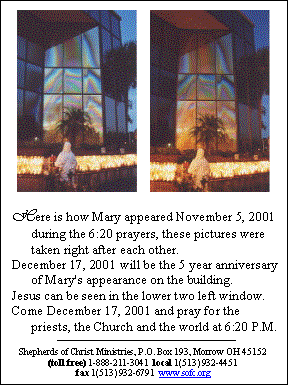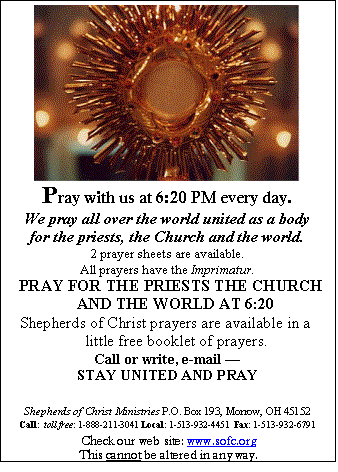Mary has requested that the daily message be given each day to the world. It is
read nightly at the prayer service from her Image Building in Clearwater, Florida, U.S.A.
This is according to her request. All attempts will be made to publish this daily message
to the world at 11p.m. Eastern time, U.S.A.
We acknowledge that the final authority regarding these messages
rests with the Holy See of Rome.
|
 |
January 3, 2002
January 4th Holy
Spirit Novena
Scripture selection is Day 1 Period I. |
The Novena Rosary Mystery
for January 4th is Joyful. |
We really need the $35,000
for the postage
for the Newsletter Book II so they can
send it as soon as it is printed.
Our donor will match the whole $35,000.
|
This is from the president
Newsletter Book II update:
We received $45,000 for the Newsletter Book II.
We need at least another additional $30,000 for
postage.
The donor has already matched the first $40,000.
Please help us with the postage so the priests can
receive the Newsletter Book as soon as it is printed.
Thank you so much for all who have given. We really
want to please God the Father this Christmas.
|
|
Messenger: We
have a Donor that will match the funds for the Newsletter so for every
$1 you give, the donor will match the money for the Newsletter until
we get $150,000 for the Newsletter Book II.
Jesus wants it out
—
Please we need the
money urgently because God the Father wants the Newsletter Book II out
by Christmas.
Excerpt from July 14, 2001 message
Mary speaks:
...The
Father wishes the Priestly Newsletter Book II
to reach all the 75,000 Priests. Pray Hourly
for
funds for this. ..Please
if you can help, help
me.
Sending the Priestly
Newsletter Book II to the
75,000 Priests will help to change the face of the
earth.
end of excerpt from July 14, 2001 message
Excerpt from August 18, 2001 message
Messenger: ... We need to send the Priestly
Newsletter Book II
to the priests of this earth.
This is God's plan. God the Father said
"The Priestly Newsletter Book II would
help to change the face of the earth."
end of excerpt from August 18,
2001 message
Excerpt from October 19, 2001 message
Mary speaks: ... Please
I ask you to get my Son's priestly
Newsletter Book II, with the
prayer manual to my priest sons
by Christmas.
These writings were directed by my Son Jesus and given
to Father Carter to circulate for the renewal
of the Church and the world.
The Father has said this book will help to
change the face of the earth.
end of excerpt from October 19,
2001
|
January 3, 2002
Jesus speaks: My
dear earth and all Shepherd of Christ
Members.
I call you to special days of prayer
January 12-17 for the Priestly Newsletter
Book II and the Prayer Manual
and its mailing.
I call you to pray through the intercession
of Our Lady of Clearwater and
your Founder Fr. Carter.
On January 17 you will end with the
Prayer Services at 6:20 in
Morrow, Ohio.
Your prayers should focus on this
for these 6 days and for all
priests receiving the mailing,
for the publication and distribution
of the Newsletter.
Wherever you are on the earth, you must
see yourselves as united deeply in prayer.
In these dark, cold days of winter
around the earth, your love and
your fervor to pray united as a body,
united to the Mass can help to bring
down great grace for the souls of the
earth.
Here is the message I gave to the earth
January 22, 1998.

A Message for the Earth from Jesus
January 22, 1998
Jesus speaks: I am the Good Shepherd, these are My
prayers, the prayers I give to help renew the Church and the world, all prayer
chapters are asked to include these prayers (found in the Shepherds of Christ
Prayer Manual). As My Apostles and Shepherds I ask you to encourage all
existing Chapters to try to encourage all existing prayer groups to pray the
Shepherds of Christ prayers. Encourage all Churches to pray these prayers. It
is most urgent that the people of this earth concur with the Father's wishes
to begin Prayer Chapters. This is an urgent request from the Good Shepherd.
The flock will become one when they have given their hearts to Jesus and Mary.
Encourage all priests to pray the Shepherds of Christ prayers. Your world will
be lighted with great light as the people of this earth pray these prayers.
My promise is this to you My beloved
earth: When you give your heart to Me and spread the devotion to My Sacred
Heart, I will write your name In My Heart. I promise to give the greatest
graces when you pray these prayers for renewal of the Church and the world and
take all who pray them deeply into My Heart. The prayers I give will bring
about the reign of My Sacred Heart and the triumph of Mary's Immaculate Heart.
I am Jesus Christ, this is My message of January 22, 1998, Please circulate
this message to your world. I am the Good Shepherd, I know Mine and Mine know
Me and they follow Me. Grace My Shepherds, I will give you the greatest graces
for spreading these words to this earth and to your Church. I love you, I am
Jesus Christ, the Son of Man, it is the Plan of the Father that Prayer
Chapters are begun immediately and the Priestly Newsletter is given to all
priests. The Voice of the Good Shepherd speaks through it.
end of January 22, 1998 message
January 3, 2001 message continues
Jesus speaks: Do not
give into satan. He wants you to focus
on yourselves and to focus on others and
their faults.
Rely on My Might.
Sing the Song - Night is Over.
On January 5, 2001 I will talk to you from My
site in Florida.
This Rosary is broadcasted live from Florida
to China and Morrow and Toledo and
Iowa and Jasper, Indiana and
to other places.
If you desire to be connected in holy
prayer on this First Saturday
call Morrow.
I want you to pray deeply for the
Priestly Newsletter on January 5.
If you cannot be connected to the broadcast
in Florida pray united as a body at 6:20,
listen to the tape of Fr. Carter praying the
prayers if you have one and pray united
with all at this time.
I call for a special month of unity. I call you
to be united in this effort to get the Priestly
Newsletter Book II in the hands of the priests,
Pray for grace.
The Father speaks:
Such a mailing can help to
change the face of the earth.
Jesus speaks:
You are one body. See yourself as
part of a whole, the Shepherds of Christ Movement.
I am the head of My Movement, I call
you to unity, I call you to pray
united as a body for this endeavor.
Offer up your sufferings for this, for
the priests, the Church and the world.
Those who are Apostles of the Eucharistic
Heart of Jesus, be faithful to your commitment.
If possible make an added effort to join
in 6:20 prayers especially on Jan. 5, Jan 12-17.
Pray your morning offering.
Build up the body.
Servants and handmaids be faithful
to your hourly prayers, if you cannot
do the long ones for some reason, stop
on the hour and do the short ones, include
the urgent intensions and the Priestly
Newsletter Book II. Pray for funds and grace.
Pray for all in the Movement, all touching the
Movement, all those over you. Pray for priests receiving
the book to get grace.
Be faithful in praying your morning offering,
and your Shepherd of Christ prayers daily if possible.
Go to daily Mass and do adoration before the
Blessed Sacrament.
No matter where you are, you can be united
deeply in your hearts in prayer. Pray for
this endeavor.
Pray for the priests, the Church and the world.
Your life is so important to Me.
I love you so much.
Don't give into satan.
Focus on Unity.
Excerpt from Response to God's Love
Chapter 8
The Christian Encounters Others and the World
In various ways, we have
already discussed the Christian's encounter with others and the world (see
chapter 3, for example). We now wish to continue this theme of encounter with
greater specificity and extensiveness.
The true Christian is
imbued with consciousness of others. That is to say, the true Christian is
keenly aware that, to a great degree, God intends each of us to press on
toward maturity in the spiritual life through a proper encounter with others.
Indeed, the Christian imperative reminds us that we are to walk life's path,
not in isolation, but hand in hand with our fellow human beings.
To authentically
encounter others we must be properly aware of who they really are; we must, in
short, be able to penetrate beyond surface appearances, which may or may not
be appealing to us, and contact others in their core existence. When we are
truly in touch with others at the core of their beings, we are simultaneously
aware of their awesome dignity. We are conscious that these persons are
created and redeemed by God in his love. Fortified with this proper awareness,
we are thus in a position to relate to them as we should.
In order to be in touch
with the inner self of others, we must be aware of or in touch with our own
inner or true self. This awareness, in turn, is an awareness that our self is
likewise made in the image of God, that it has been divinized in Christ and is
to be oriented toward God and neighbor. Here, then, we see the profound
interaction between the three awarenesses and loves—awareness and love of
God, self, and neighbor. As Christians, consequently, we should have a
maturing sense of how our existence is, in varied ways, profoundly interlinked
with the existence of others. This feeling of union with others is not limited
to those we directly encounter, but, in some sense, is directed to all members
of the human family.
Let us now consider some
of the main attitudes that the Christian should maintain and develop in his or
her dealings with others. We will build upon the very basic attitude we have
already mentioned—that we must always try to be aware of the true self of
others, the self that has been created and redeemed by God's love. This
awareness, in turn, calls forth our own love for them.
In dealing with others,
we must strive to maintain the balance, so delicate at times, between
independence from others and dependence on them. We must, on the one hand,
humbly realize that in so many varied ways we consistently depend on others.
Have you ever tried to analyze the many, many people you depend on to make it
through a very ordinary day? Have you ever tried to enumerate all the people
involved—most of whom you don't even know—in putting a simple meal before
you?
The consciousness of our
dependence on others narrows into much sharper focus, of course, regarding
those we encounter daily in a more direct fashion. The members of our
families, our friends, our coworkers—these are some of the people we
immediately think of as we reflect upon the mutual interdependence that exists
among fellow human beings. We depend on such people in a special way for the
growth opportunities of loving and being loved, of serving and being
ministered to, of affirming and being affirmed—in short, for all the
opportunities of variously giving and receiving.
If, however, we must, on
the one hand, strive to maintain a sense of proper need for others, we must,
on the other hand, couple this with a thrust toward independence. To have an
attitude of healthy dependence on others is a main ingredient for true
personality growth; to maintain a morbid need for others, however, is a
serious obstacle in becoming the persons we are destined to be. We should
never become slavishly dependent on the company of others, their love, the
attention they give us, the approval they give to us, our ideas, or our work.
It is, of course, always very pleasant to receive love, attention, and
approval; all this, however, must occur within the framework of God's will for
us. We must constantly strive to lovingly do his will at all times and in all
circumstances. This is the all-embracing and all-necessary imperative that
permeates every facet of our being. When we live according to this imperative,
we gladly and gratefully receive love, attention, and affirmation from others
when it is forthcoming; what is more, we realize that to be offered this is a
part of God's plan for us. If, however, it is not forthcoming at any one time,
we courageously continue to live as we think God intends, aware that, in his
loving faithfulness, God will compensate for what currently appears to be a
lack of human support.
Early in our discussion
of the Christian's encounter with others, we should obviously say a few direct
things concerning the core attitude of love, a trait that should permeate all
other attitudes. It is well to begin by observing a phenomenon of our culture
concerning love: Many persons who choose marriage say they do so out of a
desire to be loved. Notice, they say that they marry out of a desire to be
loved, not to love. In fairness to these persons, perhaps we should presume
that they realize they in turn must also offer love. Yet, is it not revealing
that they explicitly mention as the reason for marrying a desire to be
loved? Could there be a close correlation between this phenomenon and the
extraordinarily high divorce rate that prevails in our culture? If it is
common that both partners enter marriage more from a need to receive love than
from a desire to give it, do we have to look further for the reason to explain
why so many marriages are plagued with various degrees of unhappiness?
We should realize that
all of us are in danger of falling into the above temptation. Whether we are
married people, celibates in the priestly and religious life, or single
persons in the world, all of us have to be aware lest we be more concerned
with receiving love than in giving it. God wants us to receive love, and we
have a need to receive love; however, we must not allow this legitimate desire
to degenerate into a morbid preoccupation whereby we always enumerate all the
different ways that others should be manifesting love toward us while, at the
same time, we ourselves might be guilty of neglecting numerous opportunities
for loving them. If our main concern is to love others rather than to be loved
by them, I think we will more often than not be surprised at the love others
show us over a lifetime. Nonetheless, even in the event that we might feel
slighted in this regard, our vocation as Christians is eminently clear: we
ourselves must continue to love even when it is extremely difficult to do so,
thus following the example of Jesus who loved even those who nailed him to the
cross.
As maturing Christians we
should be assimilative individuals. In various ways, we must be able to absorb
from others, not in an artificial way that does violence to our uniqueness,
but in a manner that actually enhances our uniqueness. Our wonderful privilege
is to assimilate ever more and more the truth, the goodness, the beauty of God
himself by, among other ways, realizing that God is variously reflected
through all the human persons he has created. Just as we are created in God's
image—and thereby are reflective of his perfections—so also are all
others. When all humans are true to God's designs, all do indeed provide
various opportunities to one another for personality growth. All of us, I am
sure, can recall more than one instance in which we felt especially inspired
to become better persons because we have encountered certain individuals.
The preceding discussion
easily leads us to another trait that should characterize our dealings with
others—namely, we should be evocative persons. By what we are and say and
do, we should evoke, or call forth for further development, the truth, the
goodness, and the beauty that is inherent in each human person. When we
encounter others, we should want to aid, not hinder, them in their quest for
personal growth. We are evocative persons in various ways: by offering
appropriately affirming words of encouragement and commendation; by simply
being kind to others; by wanting sincerely to share others' joys and sorrows;
and by helping others realize that they are unique individuals with a unique
mission to fulfill. These and other ways—which, again, should all be infused
with appropriate love—are constantly available to us; collectively, these
ways are a constant reminder to us that we can be evocative personalities not
only on rather rare and so-called special occasions, but also on the special
occasion of every day, for, indeed, each day is a precious gift from God.
In encountering others,
we must, of course, be aware that we should not strive to make others into
replicas of ourselves. In being both sources of assimilation for others and
evocative factors in their lives, we must constantly shun the temptation to
try to make them like us. Although we hope that others will benefit from
encountering our positive characteristics, the process of growth—whether we
ourselves or others are a source of it—must be accomplished according to
each one's uniqueness. As a matter of fact, the more we aid others in growing,
the more their uniqueness will become manifest. This principle is particularly
applicable in close personal encounters such as deep friendship and marriage.
In such instances, we must all the more resist the temptation to make the
other more and more like us.
Communication is obviously a very
important element as people deal with one another. A dominant problem plaguing
numerous marriages and families is a lack of communication between the spouses
themselves, between the parents and children, and among the children
themselves. Obviously, a lack of communication also causes problems between
friend and friend, between employer and employee, between teacher and student.
There is no need to continue the list—your own experience can add example
after example.
Authentic communication
requires a willingness on the part of the parties involved to appropriately
share ideas, problems, ideals, joys, and sorrows. Words are obviously
involved, but not all words are helpful. We must therefore strive to discern
which words are helpful and which words are not—a task that is not always
easy. Further, the increasing quantity of words is not always the measure of
progressive communication; sometimes the more the words are increased, the
more the communication suffers. What matters most is the quality of
the words that are spoken, the motivation that prompts them. Also, not all
those who are involved have to speak and listen equally. If we attentively try
to evaluate all the circumstances—including the different personalities
involved—we will tend to contribute our appropriate share of listening and
speaking. Furthermore, we must always remember that communication occurs in
ways that are over and above the spoken word. Finally, we should realize that
authentic communication must be rooted in the mutual respect and love that
should guide all our dealings with each other.
Our ability to contribute
to the process of communication is, in turn, enhanced by our emphatic
attitude—that is, our ability to enter into the feelings, the ideas,
and the experiences of others. An empathic attitude is another trait of the
true Christian. We can grow in this spirit of empathy by realizing that many
of our own experiences are also the experiences of others. If we experience
the desire for love and acceptance, so do others; if we feel the pangs of
loneliness, so do others; if we have to fight lethargy and boredom, so do
others; if we have to struggle with despondency, so do others; if we desire
words of encouragement, so do others. If we continue to grow in the spirit of
empathy through a consistent realization that, in so many ways, we all share a
common lot, then all the types of personal encounters we experience will
correspondingly be enhanced.
The true Christian also
realizes that special love and concern for a few should proportionately and
appropriately deepen love and concern for all others. This, then, is a very
good criterion to apply to special relationships—for example, friendship and
marriage—to determine whether they are all that they can and should be. Do
these relationships expand my horizons, my concern, my love? Do they help me
be more sensitive to the fact that God has created all of us brothers and
sisters to one another—whether we are black, white, brown, or whatever? Or,
on the other hand, do these relationships narrow my love and attention almost
exclusively to the special few involved? If the former description
characterizes us, we have cause for rejoicing; if the latter description
characterizes us, then we should be concerned and attempt to correct the
failing.
At this stage of our
discussion concerning the Christian as he or she encounters others, it has
become evident that many different attitudes, factors, and circumstances are
involved. We realize, therefore, that we constantly need a sense of
perspective in the whole matter. Sometimes we have to strive mightily to
preserve perspective in our various and diversified dealings with others
because all sorts of feelings are involved. Moreover, in very close
relationships, we must adopt special means for preserving perspective because
these types of relationships demand special involvement and, thus, include
more and deeper feelings. Special relationships, therefore, obviously test our
sense of perspective more often and more diversely than other, less intimate
types of personal encounter.
Having already alluded to
friendship, it seems opportune to make a few observations concerning this very
special kind of relationship. Friendship is one of God's greatest gifts. It is
a type of personal encounter that befits any age and any vocation or state of
life. One of the beauties of friendship is the special type of love that is
involved. Two people become friends and remain friends because they mutually want
to do so. In friendship, there are no juridical bonds as there are in marriage
and family life. In real friendship, this special freedom that both parties
possess regarding the initiation and maintenance of the relationship does not
instigate insecure feelings, but rather enhances the encounter with a special
kind of splendor.
One of the other beauties
of friendship is the obvious fact that a person may have more than one friend.
For various reasons, however, it seems that, for most people, deep friendship
is possible only with a relatively few. Whatever the case might be, a person
should not view his or her multiple friendships as being in conflict with one
another. A person's various authentic friendships, all providing their own
opportunities for growth, clothe the person with a maturing richness of
personality that increasingly contributes to the health and vitality of each
of the friendships in particular.
Close friends stand side
by side and together walk the path of life. Secure in the other's acceptance
and love, each feels a sense of relief that he or she does not need to
maintain any kind of facade. Each is encouraged to be and to become according
to the real, the true self. Far from hampering the proper unfolding and
developing of each one's personality, the friendship offers many diverse
opportunities for the maturing of each other's uniqueness. Indeed, each person
feels that without the other he or she may not have grown so well in certain
facets of self-knowledge; each person feels that without the other he or she
may not have grown or become in certain ways at all.
Close friends share many
things. They share life's ideals and goals, for example, and in this sharing
feel encouraged to achieve a greater realization of their ideals and goals.
Close friends share each other's sorrows, and in this sharing the sorrows
become much more bearable. Close friends share each other's joys, and in this
sharing the joys become greatly increased. Close friends share each other's
failures, and in this sharing they gain the strength to rise and try again.
Close friends also share each other's successes, and in this sharing are
encouraged to fulfill more and more their mission, their work in life.
Each one of us, then, has
many reasons to thank God for the wonderful gift of friendship, for, indeed,
friendship has in so many diverse ways helped us to be and to become. In so
many diverse ways, the gift of friendship has helped us live the paschal
mystery of death and resurrection. Truly, it has helped us bear the dark, the
difficult, the worrisome aspect of life with greater equanimity and courage;
likewise, it has helped us experience the bright, the pleasant, the exuberant
side of life with greater joy.
end of excerpt from Response to God's Love

Use Your Talents

October 3, 1993 Chicago Marian Conference 11:30a.m.
Jesus speaks: I am your Savior, Son of the
Living God. I come to you that you might have life, not as the world gives you
life, but My life which is life eternal. I carved you from My special carving
and made you little less than an angel. I love you and cherish all the moments
when you, My special child, come to sit with Me. I wait here and I hope you
will choose to come, but I never force you. Your will is totally free and I
give it to you because of My love and the will of the Father. I inform you in
numerous ways. You do not have to guess and wonder. Come be with Me in this
silence and all you need to know will be told to you. Your life is unfolding
as a beautiful rose. Each petal falls and you plant My odors about as I so
desire. I make your life full and sure as you trust in Me. No need for
worrying, My little flower. My ways give you freedom if you listen to your
heart. I am a personal God and you know Me as giving you fullness and life.
You know there is some magnetism to Me and the way you crave to be part of Me.
This is the work of the one, true God Who created you with a thirst that can
only be quenched by Me. All roads that lead to Me give you fullness, worth,
peace and joy, not as the world thinks, but as you yourself know true peace
and joy. When I really touch you, you do not remain the same. I shed My Blood
for you that you will have the life only I can give. What friend in this world
would die for you? You, My child, were worth My dying for. I came that you
will have life eternal and the gift I give is My Precious Blood for your sins.
Come to Me in trouble and when you are bowed down. Come to Me in joy. Come to
Me every day that you live and I will give you all you need. Seek to know Me
more and more. Knowledge of Me, being with Me, are the only way to perfect
peace. They lead to eternal life.
I have a divine plan for you. I created
you with special gifts and talents to be used to do My work. They are not for
your own self-promotion. You, My child, are nothing except as I created you.
Why try to promote yourself? It is none of your own doing. I gave you the
talents you are using. You had nothing to do with it. These talents were given
to you to do My work. To use these talents to make yourself feel better than
your brother is indeed a sin. You must realize they are loaned to you to work
for Me. As you give someone a car, or loan them a place to stay, I loan you
your talents to use to work for Me. If you do not work for Me and use them to
make yourself better than your brother, you are offending Me. Likewise, if I
give you talents and you do not use them because you think you are not as good
as your brother, you are not being thankful to Me for My gifts to you. You are
not using My gifts and that offends Me greatly. Each person was created by Me
to do My work. Each person has all he needs to do My work. To be envious of
others is fruitless. They have their job. You have yours. You are not supposed
to do their work. That is why you were not given their talents.
Do your own work. Don't be envious of
your brothers. Don't hide your talents. You did not earn them. I gave you your
talents. You must sing because I will it. Others must do as I will them to do.
It displeases Me to give you a gift and watch you hide it and make light of
it. I give the gift. You must use all your gifts. They were given to you to do
My work. Your brother has his gifts. Be grateful for your brother and he
should be for you. You are all chosen by Me for a special mission. You know
what to do. It feels right. I plant little seeds in your heart and all you do
that is for you in the end feels right. You are not to be doing your brother's
work or he yours. Talk to Me that you might know just what your work is and do
it.
Do not hide your talents. Praise your God
Who gave you these talents. Embrace and use them. This is not pride. This is
My plan. I love you. I give to each of you, My precious children, as a mother
who buys special Christmas gifts for each child. To buy gifts all the same for
all your children is not to respect their specialness, their individuality.
Oh, I love you, little ones, so much.
Please come to Me. I am so good and I wait to be with you and share My love
with you. Come now. This is your top priority. All else will work when you
come to Me first. I love you. You are My chosen children. Come and be filled
and I make your loads light and I fill you with the Spirit of Salvation.
All roads that lead to Me are the right
roads. Praise Me for I am good and I love you, little dear ones.
end of October 3, 1993
Excerpt from Newsletter 2001 - Issue 1
e) Relationship with Members of the Church
There
is but one true Church of Christ. Yet this one Church has three different
states of existence. There is the pilgrim Church, the Church of this world,
composed of members who have received the grace of Christ and strive for its
development. They have not yet obtained the goal of their efforts, as have the
members of the heavenly Church, who enjoy God in eternal happiness. The Church
suffering is an intermediate state of existence necessary for those who had
not achieved the required purification as members of the pilgrim Church.
Although there are these three phases of the Church’s existence, there is a
profound union existing between all the members. All these members possess the
same basic life of grace in Christ, and this common life establishes the most
intimate bonds of love. In our preceding chapter, we discussed the pilgrim
Church. Let us now consider the Church suffering and the heavenly Church.
The
members of the Church suffering are those who have departed from this life in
an incomplete state of Christian development. Their development is incomplete
in the sense that grace has not fully taken possession of them, and, as a
result, they are yet closed in upon themselves to a greater or lesser degree.
They as yet cannot open themselves out in complete love to the Triune God in
the beatific vision. They must undergo a further purification, a purification
which could have been achieved upon earth with merit. Now the purification
must be achieved with no merit attached. The pain of this purification is
mixed with the certain expectation of achieving the vision of God. We can
hasten the advent of this vision for this people by the offering of prayers
and other good works. Scripture itself refers to our action on behalf of those
in purgatory in Chapter 12 of the Second Book of Maccabees beginning with
verse 38.
The
members of the heavenly Church are those in whom the life of grace has taken
full possession and has reached its completion in the life of glory. Faith now
is unnecessary, as the light of glory gives the human intellect a new strength
and capacity for seeing God face-to-face. While the Christian was a wayfarer,
he received the imprint of the indwelling Trinity as he shared in God’s own
life. Now in heaven that grace-life and possession of God reaches its
completion—the absolute completion is not achieved, however, until the
resurrection of the body. The divine persons give Themselves to the beatified
in a profound union far surpassing that of the indwelling of the Trinity
experienced here below.
This
life of heaven is still the Christ-life, for just as we possess a share in
Trinitarian life here below as mediated by Christ, and exercise this
grace-life as structured by Him, so also in heaven is the mediation of Christ
present. In the words of Rahner, "One always sees the Father through
Jesus. Just as immediately as this, for the directness of the vision of God is
not a denial of the mediatorship of Christ as man."14
And not only does the humanity of Christ unite the blessed to God, but also,
in some way, to the whole of creation. This is merely a completion of what is
begun here below, namely, the union with Christ in His humanity establishing
the Christian in a special relationship with God, with other men, and with the
whole of creation. We have a glimpse, therefore, of the fullness of life which
members of the heavenly Church possess.
The
heavenly Church, as St. Thomas says, is the true Church.15
The Church of this earth and the Church of purgatory are, each in its own way,
reaching out in loving hope for the heavenly Jerusalem. Vatican II puts it
very simply: "The Church, to which we are called in Christ Jesus, and in
which we acquire sanctity through the grace of God, will attain her full
perfection only in the glory of heaven."16
The
members of the heavenly Church can help us in living our life of grace until
we too share its fullness with them. Their power of intercession on our behalf
is but another ramification of the communal aspect of Christianity. We are
meant to help others grow in Christ. We, in turn, are intended by God to
receive aid from others—yes, from members of the heavenly Church, as well as
from those with whom we dwell here below.
Not
only can we be aided by the saints’ intercession, but the example of the
canonized saints can also be of great value to us. They have concretely proved
that full holiness is possible. Such an inspiration is of real worth when we
are tempted to think that Christian sanctity in its higher degrees is
impossible of attainment. Moreover, the canonized saints, in their diversity,
teach us that there are many authentic versions of Christian holiness. They
can be innovators in showing us that there are numerous possibilities in
assimilating the mystery of Christ, although the basic assimilation remains
the same for all Christians of all times. In the opinion of Rahner this is one
of the chief roles the canonized saints exert in the life of the Church.17
NOTES:
16. Second Vatican Council, Constitution on the Church,
No. 48.
17. Cf. Karl Rahner, Op. cit., pp. 100-101.
end of excerpt from Newsletter 2001 - Issue 1

Nursing Home Mass Video
We updated the Nursing videos so that if you have a good dialup
connection, you should be able to watch the movie live.
Click Here for help
with Videos
 click here to download the Nursing
Home and Homebound Mass video (12.3 MB)
click here to download the Nursing
Home and Homebound Mass video (12.3 MB)
This ad cannot be altered in anyway.

Download the free  software to view and print the PDF files
of the advertisements
software to view and print the PDF files
of the advertisements
 PDF file of Advertisement
PDF file of Advertisement
Please allow a couple of
minutes to download, thank you.
This ad cannot be altered in anyway.

 PDF file of Advertisement
PDF file of Advertisement
Please allow a couple of
minutes to download, thank you.
It cannot be altered in any way.

Download the free  software to view and print the PDF files
of the advertisements
software to view and print the PDF files
of the advertisements
 PDF file of Advertisement
PDF file of Advertisement
Please allow a couple of minutes to
download, thank you.
This cannot be altered in anyway.

 PDF file of Advertisement #1
PDF file of Advertisement #1
Please allow a couple of minutes to
download, thank you.
Messenger: A shorter ad may be as follows.
This cannot be altered in anyway.

 PDF file of Advertisement #2
PDF file of Advertisement #2
This cannot be altered in anyway.

 PDF file of Advertisement #3
PDF file of Advertisement #3
NOTES:
12. For background material on Fatima, I am particularly
indebted to
Our Lady of Fatima's
Peace Plan from Heaven
(Rockford: TAN Books and
Publishers, Inc., 1983).
13. Ibid., p.5.
Table of Contents
Previous
Daily Message
Main Shepherds of Christ Page
 Copyright
© 2001 Shepherds of Christ.
Copyright
© 2001 Shepherds of Christ.
Rights for non-commercial reproduction granted:
May be copied in its entirety, but neither re-typed nor edited.
Translations are welcome but they must be reviewed for moral and
theological accuracy by a source approved by Shepherds of Christ Ministries
before any distribution takes place. Please contact us for more information.
All scripture quotes are from the New Jerusalem Bible, July 1990, published by Doubleday.
Revised: January 3, 2002
URL: http://www.SofC.org
Contact Information for Shepherds of Christ
Email: info@SofC.org
Shepherds of Christ Ministries
PO Box 193
Morrow, Ohio 45152-0193
Telephone: (toll free) 1-888-211-3041 or (513) 932-4451
FAX: (513) 932-6791









